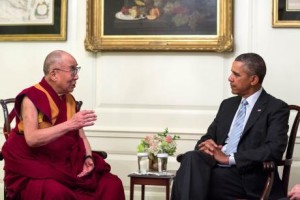China’s Subversive Propaganda War against the Dalai Lama
BRICS, 30 Jun 2014
Gerardo E. Martinez-Solanas – Open Democracy
The Chinese government is engaged in an intense propaganda war to disrupt or prevent the Dalai Lama’s visits to every country he travels to.
When His Holiness the Dalai Lama visits any country in his world travels, the Chinese Communist Party’s propaganda gets in motion with angry statements. In addition, the Chinese government moves all their means, including diplomatic and commercial influences, to put pressure on the country being visited, often achieving the cancellation of that visit.
The most recent case was His Holiness visit to the United States last February. China urged President Obama to call off the meeting at the White House, with the argument that “by arranging a meeting between the President and the Dalai Lama, the U.S. side will grossly interfere in the internal affairs of China, seriously violate norms governing international relations and severely impair China-U.S. relations”. This time they did not succeed to block the Dalai Lama’s visit – sadly, it seldom happens that his intended travels get such a positive outcome.
Even as the Dalai Lama speaks eloquently on compassion, happiness and – most importantly – about non-violence in resolving rivalries and conflicts, he is disparaged by the Chinese government as “dangerous” and “divisive”.
The Chinese propaganda campaign tries to deceive the rest of the World about their colonization of Tibet arguing about Tibetans having “equal rights” and Tibet being historically an integral part of China. The truth is that Tibetans and Chinese are different cultures, they speak different languages and they have been historically separated or at least autonomous. That is all the Dalai Lama is asking for: autonomy and respect for their indigenous culture.
Unfortunately, Chinese propaganda does deceive a great many people around the world. We shouldn’t blame those people – Chinese leaders are quite skilled at hiding the truth. But if we – the free and democracy loving people of the World – let their arguments go unchallenged, the international community will never achieve a peaceful resolution to the crisis in Tibet and will never uphold the right of Tibetan people to be respected and free to decide their own fate.
The International Campaign for Tibet [5] is a very small voice in this wide and dry desert of international negligence, but it is a tool Tibetans have for a better future. I urge people and governments to help them in whatever capacity their help is possible. There are many ways to exert diplomatic, commercial and other kinds of pressure in order to stop Chinese repressive tactics. Peace-loving people should also be aware of facts such as:
- Chinese officials have denied visas and press credentials to journalists to prevent them from publishing stories about Tibet and about corruption within the highest ranks of the Chinese Communist Party in their dealings in Tibet.
- The Chinese government issued a new report which asserts that China’s policies have made Tibet “prosperous with ethnic unity and democracy” – a claim clearly at odds with reality and contrary to what an independent press may find if allowed to visit that country.
- Confucius Institutes funded by China’s government in a widening range of countries all over the World and acknowledged by one Communist Party leader as “an important part of China’s overseas propaganda set-up”, keep springing-up on the campuses of some 300 universities – so far – in more than 90 countries, including the United States and many Latin American and European countries.
As deceptive and galling as such schemes may appear, they show that Chinese officials understand that if the whole truth gets out and finds echo in the World media, it will eventually hasten the end of their oppression of Tibetans.
As His Holiness the Dalai Lama reminds to any of us willing to listen to him, “In our struggle for freedom, truth is the only weapon we possess”.
__________________________________
Gerardo E. Martinez-Solanas is director of ParticipatoryDemocracy.net, a former United Nations functionary, and a political scientist and economist at the City University of New York.
Go to Original – opendemocracy.net
DISCLAIMER: The statements, views and opinions expressed in pieces republished here are solely those of the authors and do not necessarily represent those of TMS. In accordance with title 17 U.S.C. section 107, this material is distributed without profit to those who have expressed a prior interest in receiving the included information for research and educational purposes. TMS has no affiliation whatsoever with the originator of this article nor is TMS endorsed or sponsored by the originator. “GO TO ORIGINAL” links are provided as a convenience to our readers and allow for verification of authenticity. However, as originating pages are often updated by their originating host sites, the versions posted may not match the versions our readers view when clicking the “GO TO ORIGINAL” links. This site contains copyrighted material the use of which has not always been specifically authorized by the copyright owner. We are making such material available in our efforts to advance understanding of environmental, political, human rights, economic, democracy, scientific, and social justice issues, etc. We believe this constitutes a ‘fair use’ of any such copyrighted material as provided for in section 107 of the US Copyright Law. In accordance with Title 17 U.S.C. Section 107, the material on this site is distributed without profit to those who have expressed a prior interest in receiving the included information for research and educational purposes. For more information go to: http://www.law.cornell.edu/uscode/17/107.shtml. If you wish to use copyrighted material from this site for purposes of your own that go beyond ‘fair use’, you must obtain permission from the copyright owner.
